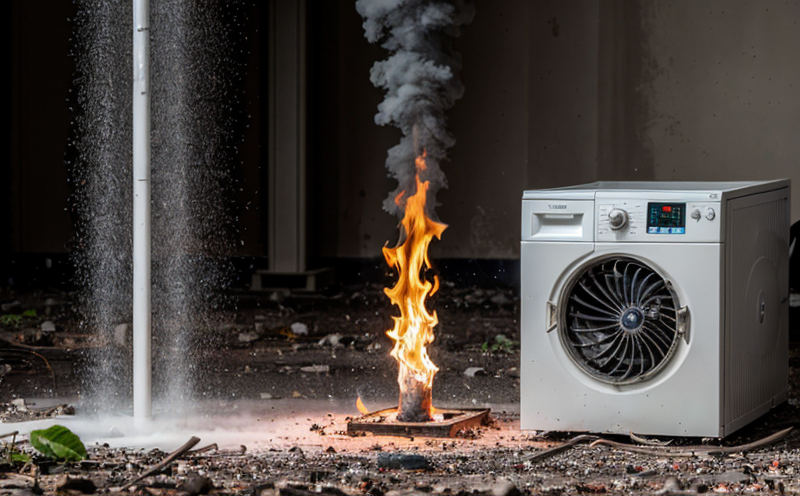SAE J2929 Environmental Stress Testing of Lithium-Ion Battery Systems for EVs
The SAE J2929 standard specifies environmental stress testing procedures for lithium-ion battery systems designed for use in electric vehicles (EVs). This testing is crucial to ensure the reliability and safety of these batteries under a range of extreme conditions that they might encounter during real-world operation. Compliance with this standard helps manufacturers meet regulatory requirements, enhance product performance, and improve consumer confidence.
Understanding environmental stress testing involves recognizing how lithium-ion battery systems are subjected to various stresses such as temperature cycling, humidity exposure, vibration, and mechanical shock. These tests simulate the harsh conditions that an EV might experience during its operational lifecycle, from hot climates where temperatures soar above 60°C (140°F) to cold environments below -25°C (-13°F), or even in high-humidity regions.
The standard outlines specific test protocols and acceptance criteria designed to evaluate the battery’s ability to maintain performance over a defined range of environmental conditions. For instance, the temperature cycling process involves subjecting batteries to repeated cycles between two extreme temperatures. The humidity exposure tests assess how well the battery performs under high-humidity environments that can lead to corrosion or degradation.
A significant aspect of this testing is ensuring that the lithium-ion cells within the battery system are capable of surviving and performing reliably after being subjected to these stresses. Testing parameters include monitoring voltage, current, temperature, and internal resistance changes during each test cycle. The acceptance criteria specify permissible limits for these variables post-testing.
Accurate specimen preparation is critical before initiating tests. This includes ensuring that the batteries are fully charged and conditioned according to specified guidelines provided by SAE J2929. Proper instrumentation like temperature-controlled chambers, humidity cabinets, and vibration test stands ensure precise control over environmental conditions during testing.
The results of these rigorous tests provide valuable data on the battery’s durability, reliability, and safety under various stressors. This information is essential for manufacturers to identify potential weaknesses early in development stages, optimize design parameters, and refine manufacturing processes.
| Test Parameter | Description |
|---|---|
| Temperature Cycling | Cycles the battery between -40°C (-40°F) to +85°C (185°F) |
| Humidity Exposure | Exposes batteries to 95% relative humidity for extended periods |
| Vibration Testing | Evaluates battery performance under simulated road conditions |
| Mechanical Shock | Tests resistance to sudden impacts and drops |
By adhering to the SAE J2929 standard, manufacturers can demonstrate their commitment to quality and safety, thereby enhancing their reputation in the market. This compliance also opens doors for potential partnerships with major automotive brands and regulatory authorities.
Why It Matters
Compliance with SAE J2929 is not just a technical requirement but also a strategic move that impacts multiple stakeholders within an organization. For quality managers, it ensures consistent product quality by identifying defects early in the development process. Compliance officers find value in meeting regulatory standards that can prevent costly recalls and legal issues.
R&D engineers benefit from this testing as they gain insights into how different environmental factors affect battery performance. This knowledge allows them to innovate and improve future products, leading to enhanced user experience and longer product lifecycles. Procurement teams also find it beneficial since it helps them source reliable suppliers who adhere to stringent quality control measures.
In essence, SAE J2929 testing plays a pivotal role in ensuring that lithium-ion batteries used in EVs are robust enough to withstand the rigors of real-world driving conditions. This not only enhances safety but also builds trust among consumers and regulators alike.
Industry Applications
- Automotive manufacturers for electric vehicles (EVs)
- Battery manufacturers specializing in EV battery packs
- R&D departments focused on improving battery technology
- Regulatory bodies overseeing vehicle safety standards
The SAE J2929 standard is widely applicable across these sectors. Automotive companies use it to ensure that their EVs meet stringent performance and safety requirements before reaching the market.
| Battery Type | Testing Requirements |
|---|---|
| Lithium-Ion Cells | Subjected to temperature cycling, humidity exposure, vibration testing, etc. |
| Packaged Battery Systems | Evaluate overall performance and stability of the entire system |
Battery manufacturers rely on this standard for quality assurance purposes. By conducting thorough environmental stress tests, they can guarantee that their products will perform optimally under diverse operational conditions.
R&D teams leverage SAE J2929 to explore new materials and designs aimed at improving battery efficiency and lifespan. Regulatory bodies utilize these test results to set industry benchmarks for safety and performance standards.
Competitive Advantage and Market Impact
Compliance with the SAE J2929 standard provides several competitive advantages that can significantly impact a company’s market position:
- Enhanced Safety Reputation: By proving adherence to rigorous testing protocols, companies demonstrate their commitment to safety, which is crucial in the automotive sector.
- Innovation Opportunities: The insights gained from these tests drive innovation by highlighting areas for improvement and optimization.
- Better Consumer Trust: Meeting or exceeding industry standards builds trust with consumers who value reliability and performance.
- Regulatory Compliance: Ensures that products meet all necessary regulatory requirements, avoiding potential legal issues.
In the competitive landscape of EV manufacturing, where safety and performance are paramount, compliance with SAE J2929 can set a company apart from competitors. It demonstrates not only technical expertise but also an unwavering commitment to delivering safe and reliable products.
Moreover, this standard enhances market impact by setting new benchmarks for environmental stress testing in the automotive industry. Companies that adopt these practices early on are likely to lead the charge in terms of technological advancements and consumer trust.





